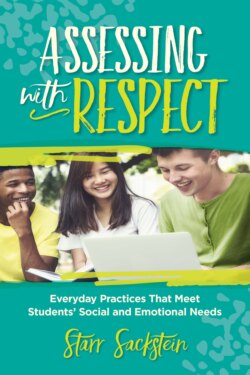Читать книгу Assessing with Respect - Starr Sackstein - Страница 19
На сайте Литреса книга снята с продажи.
Strategies for Building Constructive Relationships
ОглавлениеObviously, we want students to be friends, but friendship is not what I'm talking about here. Learning to be a vital part of a team or group is an important aspect of other kinds of learning, so it is important to promote a culture that encourages students to develop effective collaboration skills. Not every student likes to work in a group, and although we want to honor students' preferences, collaboration is an important life skill that is not inherent and must be taught.
In my book Peer Feedback in the Classroom (Sackstein, 2017), I speak about developing expert groups that allow students to effectively promote one another's learning. The concept involves teaching small groups to be experts in a particular skill or task. The groups then become the go-to students for that skill or task throughout the year, simultaneously continuing to increase their expertise through their own work. It takes at least two months to really know students' strengths and challenges, and at that point you can carefully select groups with up to five members. Because the groups may be working together on a variety of activities for the rest of the year, ensuring the right balance and dynamic is essential. That isn't to say adjustments can't be made, but changing group composition shouldn't be the default approach.
When preparing students to be experts, you first need to help them address their individual challenges related to their assigned area, which means also helping them to deal with their vulnerability with peers. As they reflect on their strengths and challenges, have them share with the group so they can develop a collective understanding of how best to work together. Sharing will also help them know what to aim for in their own work and what to expect from others. In addition, as I note in Peer Feedback,
Make sure to provide students with reading and research in the specific area they are working on that is appropriate for their level of mastery. Differentiate the materials as needed. For example, consider a couple of resources that say the same thing but in different ways. For my own writing workshops, in addition to sending students a brief explanation of each expert group's role, I taught mini-lessons to the whole class on these specific areas. I also provided resources from the Purdue OWL (Online Writing Lab) and encouraged students to ask specific questions. In addition, while we were setting up the groups, I visited with each small group, gave students time to review their small section of the paper, and answered questions as they arose. Once they are done shoring up their own expertise, students can work together to examine bodies of work found online or in a resource library in the classroom and make a bank of common mistakes or challenges to look for in their expert areas. (Sackstein, 2017, p. 83)
